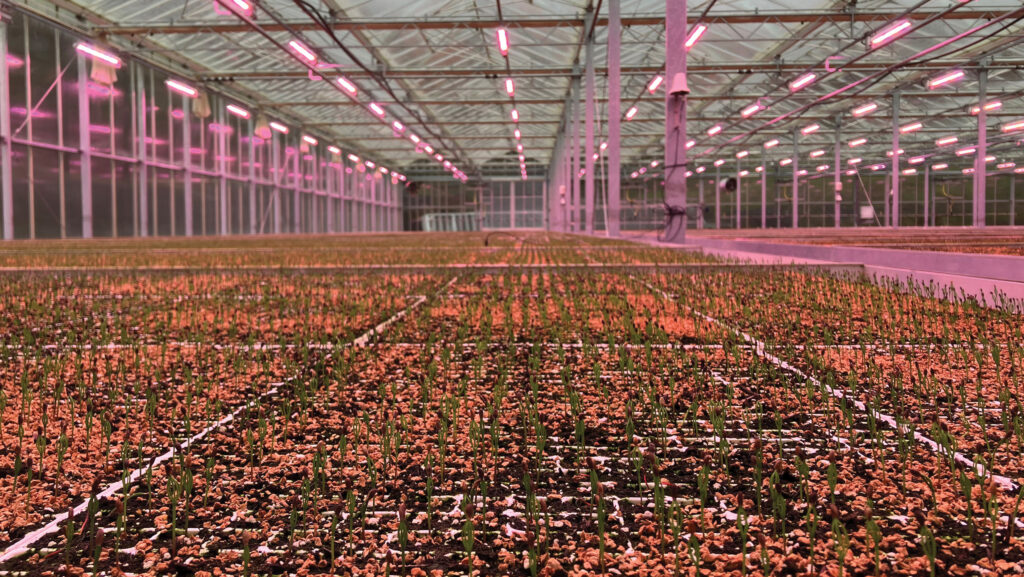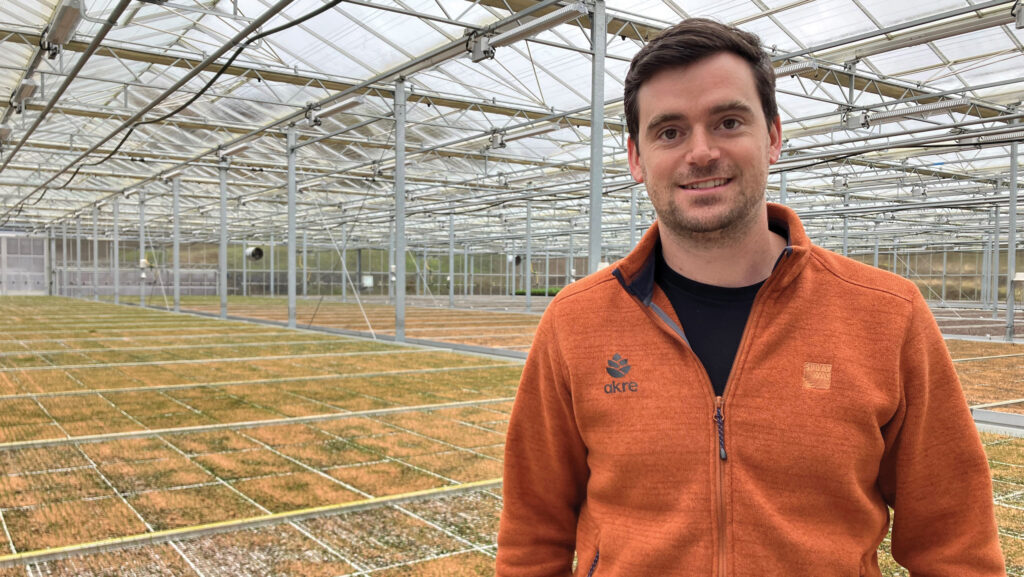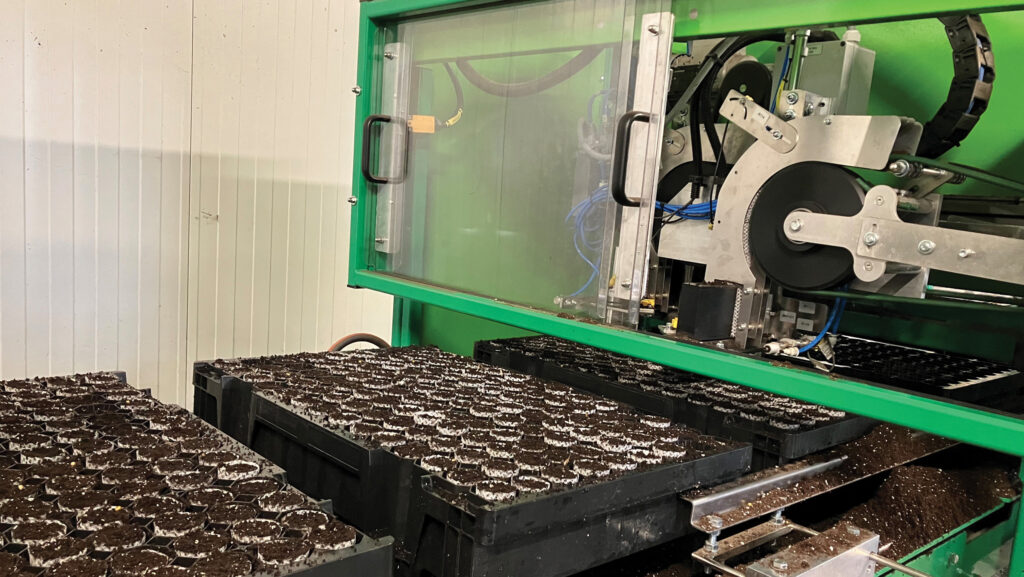World’s first verified carbon-negative tree nursery founded
 Akre tree nursery © MAG/Emma Gillbard
Akre tree nursery © MAG/Emma Gillbard The world’s first verified carbon-negative tree nursery, founded by farmer’s son Renwick Drysdale in Scotland, is seeking to help meet surging demand for tree planting and habitat restoration projects.
The company, known as Akre, encompasses a one-acre glasshouse capable of producing 7m tree saplings a year.
The one-of-a-kind tree nursery was set up in 2022 and is equipped with proprietary innovations to optimise tree production, with up to 10 times greater efficiency than global competitors.
See also: How Arable Insights farmers approach carbon opportunities
“The business has grown out of the new viability of monetising natural capital and government tree planting targets,” says Renwick.
“Akre exists to facilitate the responsible deployment of capital into these markets and to enhance habitats and rural communities.”

Renwick Drysdale © MAG/Emma Gillbard
Tree production
An array of native trees including oak, birch, pine, hawthorn, and hazel are strategically grown in the optimally controlled glasshouse.
Through the help of automatic sensor technology, the glasshouse environment can be set to optimum tree-growing conditions, which stands at a temperature of 22C and 70% humidity.
“We can open and close roof vents to change humidity levels and increase the amount of photosynthetically active radiation the saplings receive to promote consistent growth and quality,” he explains.
The saplings stay in the glasshouse for two months, and are then transplanted into their final cells.
Young saplings are grown outside for a further six to eight months.

Akre’s transplanter uses a paper pot system © MAG/Emma Gillbard
During this time, the small trees are left to root in a 3.5ha outside plot which can cater for the 7m annual tree saplings produced from the glasshouse.
This provides sufficient light, space and nutrients to enhance growth before selling on to customers, which include nurseries, on-farm nature restoration projects and private customers.
“The whole growing process takes around nine months before the trees are sold off-site. But this is very much dependent on species.
“Conifers usually take longer to develop whereas broad-leaves take less time to reach maturity,” says Renwick.
“What’s more, we promote seed provenance and biosecurity by offering a service to collect seed from the same land in which the seedlings return,” he adds.
Carbon negative
What makes the Akre tree nursery stand out from global competitors is its carbon-negative propagation process, which uses biodegradable paper cells, renewable energy and an off-grid water system.
“We use a unique mini-plug system to grow the tree saplings, which significantly reduces the use of compost and plastic.
In fact, we use up to six times less compost than traditional nurseries and zero plastic pots, which makes our trees easy to plant-out and helps reduce carbon footprint,” says Renwick.
The paper pot system was custom-designed in Denmark.
Its aim is to improve tree quality and produce robust root systems, leading to improved yields and more efficient transplanting.
“This guarantees high uniformity and low-root deformity in trees. Healthier trees suffer less transplant shock, which leads to higher establishment rates,” says Renwick.
The paper pots can be fitted into the specialist trays and facilitate techniques such as air pruning, which allows for better root development and up to a 40% greater establishment.
This system essentially enables the entire pot to fill with roots – but not tangle – to improve water and nutrients uptake. It also means that when transplanting, root structure aids tree establishment.
Energy, water and carbon audits
The Akre nursery is energy self-sufficient, thanks to a combination of solar and battery power. The nursery can also be off-grid for water, collecting rainwater and recycling it on-site.
Excess power generated by the solar panels is used to charge up a set of storage batteries, where any surplus is sent to the National Grid.
An initial carbon audit undertaken at the nursery, back in 2020, revealed overall net-carbon emissions to be 342.81 carbon dioxide equivalent (CO2e).
The audit, which is available on Akre’s website, outlined that the use of LED lighting, solar photovoltaic panels, battery storage and renewable heating could cut the figure by 77% to 92.561 CO2e.
These suggestions were put in place at the nursery, leaving Renwick with the remaining 92.561 CO2e to offset by purchasing biodiverse woodland carbon credits from the local area.
Renwick plans to review strategies, as the credits only last three years, and aims to continue to reduce the nursery’s overall carbon emissions with a yearly audit carried out.
“If we are going to help other businesses reduce their impact, we have to show we have reduced ours.”
Scaling up the Akre glasshouse design
Renwick Drysdale’s vision is to scale-up the unique nursery system across different countries.
“The plan is to set-up new nurseries each producing 30m trees.
“There is a global demand for 90bn more trees each year to meet government targets, so there is certainly scope for this,” says Renwick.
In the current Akre nursery, just two people can plant 3m trees. The glasshouse is a modular design, so it can be replicated elsewhere.
“Our largest competitor globally employees 200 staff and produces 20-30m trees each year.
“This highlights that Akre has 10 times greater efficiency. Our mission is to rollout the highly effective process into different geographies to meet growing demand for trees.”
More than just trees
Renwick adds that the business is more than just trees and offers natural capital consultancy and exchange.
Through Akre capital, the company carries out the design and implementation of restoration projects. Akre exchange helps clients register carbon and biodiversity credits and acts as a marketplace for trading carbon credits.
“We design bespoke nature-based strategies, delivering restoration plans for businesses, funds, communities, charities and private investors.”
The natural capital asset can then be recorded on the firm’s exchange platform, where it is circulated to its network of buyers.
“We aim to enhance every acre of land we interact with, be that peatland, wetland, grassland, moorland or woodland,” says Renwick.

